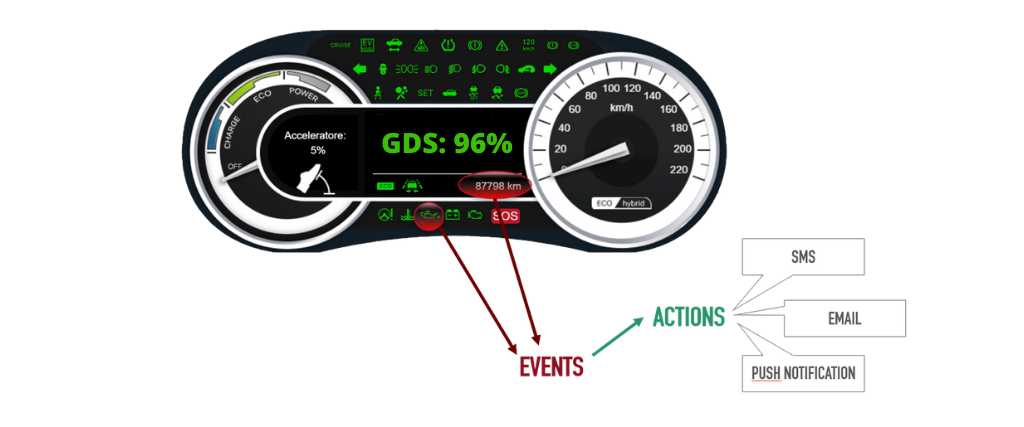Connected-cars


Connected Cars are the next "Big Thing" in the automotive industry. We all know it. It's everywhere.
All vehicle manufacturers are connecting their vehicles.
But, connecting to what?
And, what is a connected car exactly?
We asked this question to hundreds of car dealerships and thousands of people. This is what they answered:
- Connecting to other vehicles could improve traffic and prevent accidents.
- Connecting to other objects would allow our cars (and us) to interact better and understand the environment.
- Connecting to smart cities would enable us to remove traffic lights and roundabouts, simplify our journeys, and shorten our trips.
But these are all fantasies, at least for now.
OEM manufacturers are selling us the idea that a connected vehicle lets you:
- switch your car lights on and off and close the doors just by using your smartphone (wrong);
- send your next destination to the vehicle navigation system (wrong);
- and interact with the vehicle inbuilt multimedia system with just your phone (wrong).
These things are cool. But very far from what we expected.
A CONNECTED CAR MEANS CONNECTED TO THE INTERNET.

Connecting anything to the internet would open up the world to that connected object.
But why are all OEMs failing at doing a better job at this?
Let's analyze some facts.
Statistically, one person out of four would not buy a car that is continuously sending its location to the vehicle manufacturer or insurance companies. It turns out that people don't like "big brother" in their vehicles.
One person out of four is 25% of the market.
To a vehicle manufacturer, connecting their vehicles to the external world would mean cutting off 25% of their turnover.
This is why car manufacturers are connecting the driver to the car rather than the car to the internet.
This conservative attitude has two majors flaws:
- It prevents the clients to enjoy advanced location-based services (ADAS, parental control, driving behavior, to name a few).
- It prevents the Dealership from receiving vehicle data that could turn into opportunities.
THE MONEY IS IN THE DATA!

Imagine if you could receive from the vehicle information such as:
- Real-time mileage.
- DTC (Diagnostics Trouble Codes).
- Driving behavior.
You could use that data to intercept your client's needs in real-time and offer the appropriate solution.
To better explain how this can be beneficial to your Dealership, let's imagine that you were selling sandwiches instead of cars.

If you'd ask 100 people whether they want to buy your sandwich, you would probably get rejected by 99% of them:
- Because they've just eaten.
- Because they're not hungry.
- Because since they woke-up, they have already been exposed a thousand different marketing messages.

Imagine if you could install a device in people's stomach which could detect precisely when these people are hungry.
If in that very moment you could be right there and offer them your sandwiches, would you think you would sell some?
You probably guessed the answer.
Telematics is the best way to intercept your clients' needs in real-time!
Let us introduce you to the:
DEALER STATION

Why do you need it?
- KEEP YOUR CUSTOMERS. Get recognized by your customers as an innovator for offering incredible and irresistible services without ever violating their privacy.
- CREATE MARKETING LEADS FROM YOUR CUSTOMER BASE. The Dealer Station receives in real-time non-sensitive data from your customer's vehicles. After intercepting your client's needs, the software creates automatic marketing calls to action to invite your clients to visit your dealership.
- SCALE BY 400% YOUR AFTER-SALES TURNOVER. We know it's a bold statement but it is conservative. You can use telematics data to create limitless "Callbacks."
CALLBACKS
AUTOMOTIVE MARKETING AUTOMATION
"Callbacks" are virtual jobs that you can assign to each vehicle in which you've installed a telematics device. Callbacks follow the: EVENT / ACTION logic.
For instance, you may want to service those vehicles that have traveled 10.000 miles.

You can trigger callbacks on several types of events: miles traveled, vehicle theft, vehicle crash, diagnosis errors (thousands), customer's birthday, driving style.
Once an event is triggered, an action is taken: SMS, emails, push notifications, and calls.
How would your clients react to a message like this:
"Hey Jane, we hope you're great. It looks like your BMW has a failure on the ABS. We've already ordered the parts, and we can fix it for you in a blink. Call us to arrange an appointment. Have a wonderful day. Your Dealership."
Want to know more?
Book a call with a representative to check if we can be a good fit for your business.
